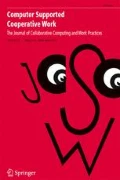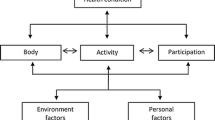Abstract
Appropriation is the process by which peopleadopt and adapt technologies, fitting them intotheir working practices. It is similar tocustomisation, but concerns the adoptionpatterns of technology and the transformationof practice at a deeper level. Understandingappropriation is a key problem for developinginteractive systems, since it critical to thesuccess of technology deployment. It is also animportant research issue, since appropriationlies at the intersection of workplace studiesand design.
Most accounts of appropriation in the researchliterature have taken a social perspective. Incontrast, this paper explores appropriation interms of the technical features that supportit. Drawing examples from applicationsdeveloped as part of a novel documentmanagement system, it develops an initial setof design principles for appropriabletechnologies. These principles are particularlyrelevant to component-based approaches tosystem design that blur the traditionalapplication boundaries.
Similar content being viewed by others
References
Barreau, D. and B. Nardi (1995): Finding and Reminding: File Organization from the Desktop. SIGCHI Bulletin, vol. 27, no. 3.
Bellotti, V. and I. Smith (2000): Informing the Design of an Information Management System with Iterative Fieldwork. In Proc. ACM Conf. Designing Interactive Systems DIS 2000, New York, NY. New York: ACM.
Bentley, R. and P. Dourish (1995): Medium versus Mechanism: Supporting Collaboration through Customisation In Proc. Fourth European Conf. on Computer-Supported Cooperative Work ECSCW'95, Stockholm, Sweden. Dordrecht: Kluwer.
Blomberg, J., L. Suchman and R. Trigg (1997): Reflections on a Work-Oriented Design Project. In Bowker, Star, Turner and Gasser (eds.): Social Science, Tehnical Science and Cooperative Work: Bridging the Great Divide. Nahwah, NJ: Laurence Erlbaum.
Bowers, J., G. Button and W. Sharrock (1995): Workflow from Within and Without: Technology and Cooperative Work on the Print Industry Shopfloor. In Proc. Fourth European Conf. Computer-Supported Cooperative Work ECSCW'95, Stockholm, Sweden. Dordrecht: Kluwer.
Button, G. and W. Sharrock (1997): The Production of Order and the Order of Production. In Proc. Fifth European Conf. Computer-Supported Cooperative Work ECSCW'95, Lancaster, UK. Dordrecht: Kluwer.
Dourish, P. (1997): Accounting for System Behaviour: Representation, Reflection and Resourceful Action. In Kyng and Mathiassen (eds.): Computers and Design in Context. Cambridge,MA: MIT Press.
Dourish, P., R. Bentley, R. Jones and A. MacLean (1999a): Getting Some Perspective: Using Process Representations to Index Document History. In Proc. ACM Conf. Supporting Group Work GROUP'99, Phoenix, AZ. New York: ACM.
Dourish, P., J. Lamping and T. Rodden (1999b). Building Bridges: Customisation and Mutual Intelligibility in Shared Category Management. In Proc. ACM Conf. Supporting Group Work GROUP'99, Phoenix, AZ. New York: ACM.
Dourish, P., W. Edwards, A. LaMarca, J. Lamping, K. Petersen, M. Salisbury, D. Terry and J. Thornton (2000): Extending Document Management Systems with User-Specific Active Properties. ACM Trans. Information Systems, vol. 18, no. 2, pp. 140–170.
Gerson, E. and L. Star (1986): Analyzing Due Process in the Workplace. ACM Trans. Office Information Systems TOIS, vol. 4, no. 3, pp. 257–270.
Giddens, A. (1984): The Constitution of Society: Outline of the Theory of Structuration. Cambridge: Polity.
Greenberg, S. (1991): Personalizable Groupware: Accommodating Individual Roles and Group Differences. In Proc. European Conf. Computer-Supported Cooperative Work ECSCW'91, Amsterdam, Netherlands. Dordrecht: Kluwer.
Grudin, J. (1988): Why CSCW Applications Fail: Problems in the Design and Evaluation of Organizational Interfaces. In Proc. ACM Conf. Computer-Supported Cooperative Work CSCW'88, Portland, OR. New York: ACM.
Grudin, J. and L. Palen (1995): Why Groupware Succeeds: Discretion or Mandate? In Proc. European Conf. Computer-Supported Cooperative Work ECSCW'95, Stockholm, Sweden. Dordrecht: Kluwer.
Harrison, S. and P. Dourish (1996): Re-Place-ing Space: The Roles of Space and Place in Collaborative Environments. In Proc. ACM Conf. Computer-Supported Cooperative Work CSCW'96, Boston, MA. New York: ACM.
Kaptelinin, V. (1996): Creating Computer-Based Work Environments: An Empirical Study of Macintosh Users. In Proceedings of the ACM SIGCPR/SIGMIS'96 Conference, Denver, Colorado. New York: ACM.
Kelly, S., K. Lyytinen M. and Rossi (1996): MetaEdit+: A Fully Configurable Multi-User and Multi-Tool CASE and CAME Environment. In Constantinopoulos, Mylopoulos and Yassiliou (eds.): Lecture Notes in Computer Science 1080: Proc. Eighth Intl. Conf. Advanced Information Systems Engineering CAiSE'96, Heraklion, Crete. Berlin: Springer, pp. 1–21.
Litiu, R. and A. Prakash (2000): Developing Adaptive Groupware Applications Using a Mobile Component Framework. In Proc. ACM Conf. Computer-Supported Cooperative Work CSCW 2000, Philadelphia, PA. New York: ACM.
Mackay, W. (1990): Patterns of Sharing Customisable Software. In Proc. ACM Conf. Computer-Supported Cooperative Work CSCW'90, Los Angeles, CA. New York: ACM.
MacLean, A., K. Carter, L. Lovstrand and T. Moran (1990): User-Tailorable Systems: Pressing the Issues with Buttons. In Proc. ACM Conf. Human Factors in Computing Systems CHI'90, Seattle, WA. New York: ACM.
MacLean, A. and P. Marqvardsen (1998): Crossing the Border: Document Coordination and the Integration of Processes in a Distributed Organisation. In Wakayama et al. (eds.): Information and Process Integration in Enterprises: Rethinking Documents. Boston: Kluwer, pp. 109–124.
Orlikowski, W. (1992): Learning from Notes: Organizational Issues in Groupware Implementation. In Proc. ACM Conf. Computer-Supported Cooperative Work CSCW'92, Toronto, Ontario. New York: ACM.
Orlikowski, W. (1995): Evolving with Notes: Organizational Change around Groupware Technology. Working Paper 186, Center for Coordination Science. Cambridge, MA: MIT.
Palen, L. (1995): Social, Individual and Technological Issues for Groupware Calendar Systems. In Proc. ACM Conf. Human Factors in Computing Systems CHI'99, Pittsburgh, PA. New York: ACM.
Poole, M. and G. De Sanctis (1990): Understanding the Use of Group Decision Support Systems: The Theory of Adaptive Structuration. In Faulk and Steinfield (eds.): Organizations and Communication Technology. Newbury Park: Sage, pp. 173–193.
Reddy, M., P. Dourish and W. Pratt (2001): Coordinating Heterogeneous Work: Information and Representation in Medical Care. In Proc. European Conf. Computer-Supported Cooperative Work ECSCW 2001, Bonn, Germany. Dordrecht: Kluwer.
Roussev, V., P. Dewan and V. Jain (2000): Composable Collaboration Infrastructures Based on Programming Patterns. In Proc. ACMConf. Computer-Supported Cooperative Work CSCW2000, Philadelphia, PA. New York: ACM.
Shipman, F. and C. Marshall (2000): Formality Considered Harmful: Experiences, Emerging Themes, and Directions on the Use of Formal Representations in Interactive Systems. Computer Supported Cooperative Work, vol. 8, no. 4, pp. 333–352.
Suchman, L. (1987): Plans and Situated Actions: The Problem of Human-Machine Communication. Cambridge: Cambridge University Press.
Trigg, R., J. Blomberg and L. Suchman (1999): Moving Document Collections Online: The Evolution of a Shared Repository. In Proc. European Conf. Computer-Supported Cooperative Work ECSCW'99, Copenhagen, Denmark. Dordrecht: Kluwer.
Trigg, R. and S. Bødker (1994): From Implementation to Design: Tailoring and the Emergence of Systematization in CSCW. In Proc. ACM Conf. Computer-Supported Cooperative Work CSCW'94, Chapel Hill, NC. New York: ACM.
Wenger, E. (1998): Communities of Practice. Cambridge: Cambridge University Press.
Author information
Authors and Affiliations
Rights and permissions
About this article
Cite this article
Dourish, P. The Appropriation of Interactive Technologies: Some Lessons from Placeless Documents. Computer Supported Cooperative Work (CSCW) 12, 465–490 (2003). https://doi.org/10.1023/A:1026149119426
Issue Date:
DOI: https://doi.org/10.1023/A:1026149119426




